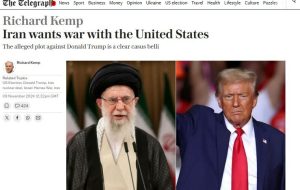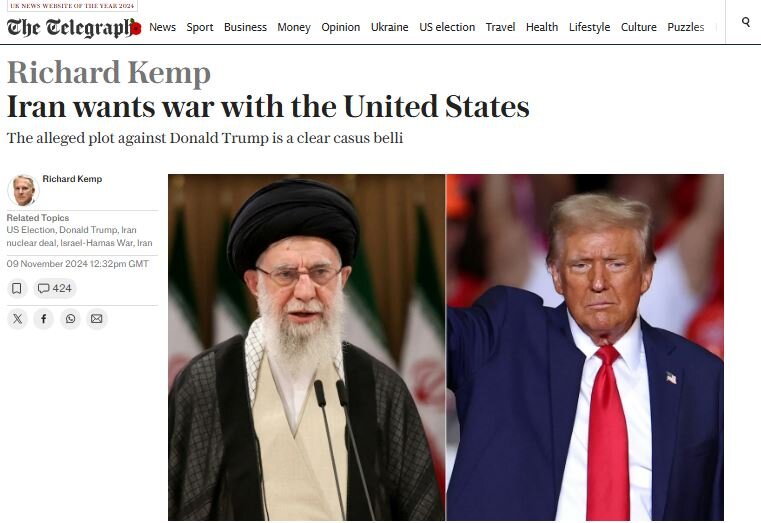Debunking the anti-Iran hysteria – Tehran Times
MADRID – Few figures so clearly embody the pompous, condescending, and aggressive approach of the West when analyzing the situation in West Asia—particularly in Iran—quite like British columnist and former military officer Richard Kemp. Before securing his weekly column in The Telegraph, where he regularly delivers anti-Iran diatribes, Kemp served as an infantry commander deployed


MADRID – Few figures so clearly embody the pompous, condescending, and aggressive approach of the West when analyzing the situation in West Asia—particularly in Iran—quite like British columnist and former military officer Richard Kemp.
Before securing his weekly column in The Telegraph, where he regularly delivers anti-Iran diatribes, Kemp served as an infantry commander deployed in Afghanistan, where he led the so-called Operation Fingal from July to November 2003. His experiences in Afghanistan became the cornerstone of his public career after his retirement, and, alongside journalist Chris Hughes, he published Attack State Red, a detailed account of his campaign in Afghan territory.
Additionally, Kemp serves as director of the UK Friends of the Association for the Wellbeing of Israel’s Soldiers (UK-AWIS), the British branch of AWIS, an Israeli organization managed by the Israeli Defense Forces (IDF) and led by General Yoram Yair. This organization is dedicated to supporting Israeli soldiers and their families with resources and aid.
In his latest opinion piece, published on November 9 under the headline “Iran Wants War with the United States,” Kemp asserts that Donald Trump’s recent victory in the U.S. elections represents Iran’s worst “nightmare.” Without pausing to substantiate this claim, Kemp contends that during the Biden administration, Iran allegedly enjoyed economic benefits due to the U.S. president’s “appeasement” policy, which Kemp claims helped bolster Iran’s political position on the international stage.
In his article, Kemp lists a series of alleged concessions made by the Democratic administration to the Islamic Republic, without providing further analysis, and ultimately concludes that, under Trump’s presidency, the stance would be radically different. Kemp even goes as far as to suggest that, regardless of the measures Trump decides to take directly against Iran, it will be crucial to remove all the “restrictions” that Biden supposedly imposed on Israel.
It is hard to take these statements seriously. No reasonably informed observer could claim, without embarrassment, that the Biden administration has placed any restrictions on Israel. Just look at the situation in Gaza, where the U.S. has not only supported Israel but actively backed its military actions. The same unconditional support can be seen in the ongoing campaign in Lebanon, where U.S. authorities continue their unwavering endorsement.
Kemp might argue that his reference to “restrictions” specifically pertains to limitations in the context of Iran, suggesting that under Trump, Israel would have a free hand to act as it pleases against the Islamic Republic. However, this argument overlooks a crucial reality: Israel has not exercised restraint due to U.S. pressures, but because of its own assessment of the risks involved in a direct conflict with Iran. Such a confrontation would incur immense material and human costs for Israel, even with the full backing of the United States.
In other words, Israel has not exercised restraint because the United States has demanded it, although it is true that Washington has attempted to prevent the conflict from escalating directly. In reality, Israel has assessed that an attack on Iran’s key infrastructure, such as its nuclear or oil facilities, would provoke such a massive Iranian response that it would be unsustainable, particularly at a time when Israel’s strategy of occupation in northern Lebanon is facing increasing challenges.
In his role as a pro-Israel hooligan, Kemp even touches on the subject of hostages captured by Hamas during the “Flood of Al Aqsa” operation, suggesting that Trump would have issued an ultimatum to the Palestinian group to release the hostages before his inauguration in two months. However, the crucial aspect Kemp ignores is the absolute disregard shown by the Israeli government for the lives of these hostages and the demands of their families.
According to reports in Israeli media, the Netanyahu government believes the hostage situation will “resolve itself in a natural and tragic way,” and plans to use their deaths as a new pretext for the permanent occupation of Gaza and the establishment of Jewish settlements in the region. In other words, the hostages have always been nothing more than a convenient excuse to continue the colonial occupation of Gaza.
Lastly, and as might be expected, the former commander turned columnist seizes upon the alleged assassination attempt on Donald Trump by Iran to justify an attack, asserting in his article that “Iran’s intention to assassinate Donald Trump constitutes a casus belli, warranting the elimination of the Iranian regime.” However, Iran’s Foreign Minister, Abbas Araghchi, mocked this story in a post on the social media platform X (formerly Twitter), pointing out that no one in their right mind could believe that a supposed assassin could be in Iran while maintaining direct communication with the FBI.
This type of news serves no other purpose than to continue fabricating a chain of equivalencies, where the signifier “Iran” is immediately associated with concepts such as “terrorism” or “destabilization.” In essence, it is a discursive construction designed to project the image of Iran as a “disobedient” state that, therefore, deserves to be disciplined at any cost.
Equally relevant is the profile of the article’s author: as already noted, Richard Kemp is a senior British military officer in the reserves. In the West, it is becoming increasingly common for active or retired military personnel to appear in the media as “experts in political and geopolitical matters,” while the voices of other specialists are relegated to a marginal space. This does not, of course, include “native informants,” whose role in the media seems to be limited to reinforcing the narrative already established by the West.
The fact that the author of an article titled “Iran Wants War with the United States” is a former military officer who commanded an infantry battalion in Afghanistan and also heads an Israel friendship organization directly linked to the Ministry of Defense carries a clear political meaning. The narrative he promotes is constructed not only around his military experience but also in line with an entirely anti-Iranian agenda.
